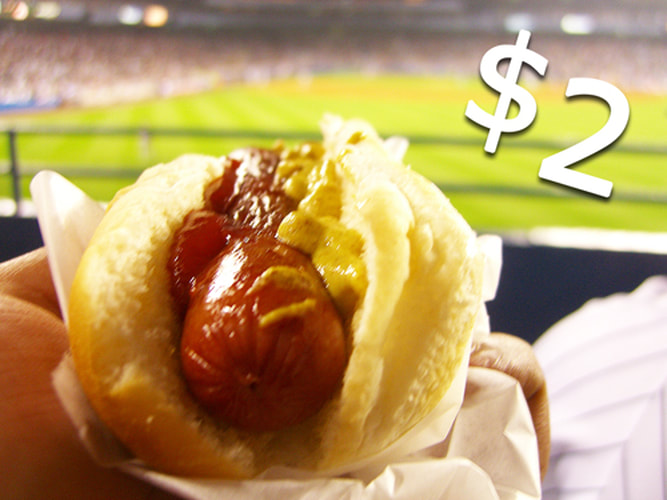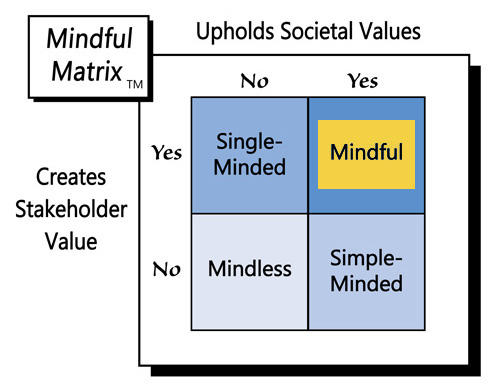For instance, the most popular concession at Major League Baseball (MLB) ballparks is the hot dog, which 63% of fans consume and which totals well over 20 million dogs sold per year. Usually such high sales volume translates into low prices for consumers—when companies sell a great deal of something their costs per unit decline, which allows them to pass savings onto customers. For some reason, however, this basic economic principle doesn’t playout for most ballpark concessions.
Out of 31 MLB teams surveyed in 2016, 24 (77.4%) sold hot dogs for $4 or more each, and 13 (41.9%) priced them at $5 or more. The costliest franks were found in New York and Miami, where both the Mets and Marlins sold their dogs for $6.00 each.
These are basically the same hot dogs that we can purchase in a grocery store for around $4 for a pack of eight, or .50 each. Granted, that pricing doesn’t include a bun or condiments, or the cost of cooking and serving the frank. Still, it’s easy to imagine that the markup on hot dogs is very high.
One study of sports stadium pricing found that the profit margin for hot dogs was 62- 81%. While very sizable, that markup was not as high as that of another stadium staple, popcorn (88-92%). Furthermore, drinks almost always maintain margins of 90% or higher.
Research conducted in 2012 calculated how much it would cost a family of four to attend a game in several of the major sports leagues. The results were a series of Fan Cost Indices (FCI). Here’s what a family of four would pay, on average, for little more than a snack—four hotdogs, four soft drinks, and two beers:
- MLB: $43.56
- NBA: $47.72
- NHL: $48.30
- NFL: $52.20
One could argue that fans aren’t obligated to buy this food; however, many stadiums don’t allow outside food, so if fans get hungry or thirsty during the course of 3-4 hours, they have no choice but to buy food and drink inside. This combination of coercion and very high prices fits the definition of price gouging: “pricing above the market price when no alternative retailer is available.”
Given the wide-spread practice of franchises overcharging fans for concessions, it’s refreshing that one firm has resolved to keep food prices reasonable. With help from the city of Atlanta, the AMB Group is building a new home for the NFL’s Falcons and Major League Soccer’s United that is due to open in 2017. At a price tag of $1.5 billion, Mercedes-Benz Stadium will have state-of-the art amenities, including a camera-shutter-like retractable roof and a 360 degree, 58-foot-high, halo video screen.
While one might expect everything sold inside a venue built for $1.5 billion and named Mercedes-Benz to command a premium price, the AMB Group has very intentionally decided to make its meals the lowest priced ones among major team sports. For instance, for just $2 each fans will be able to buy things like hot dogs, pretzels, Dasani bottled water, and regular Coca-Colas. Or, for just $3 they can choose from items like nachos, waffle fries, pizza slices, and peanuts. These prices include tax, and the Coca-Cola even comes with fee/unlimited refills. The bottom-line is that a family of four will be able to enjoy an actual meal for about $27.
How can the AMB Group offer food pricing that’s so much lower than that of other major sports venues? Has the new stadium conceded to taking a loss on concessions? According to AMB Group CEO Stephen Cannon, the arena has adopted a different business model most. Rather than selling the food and drink rights to a concessionaire, the AMB Group has contracted with a company that will function as a service provider, earning a flat fee for providing the stadium’s concessions.
The expected outcomes of retaining more concession-control are not only lower prices but also higher quality and an overall better fan experience. Satisfied fans, then, will likely buy more food, so what the stadium misses in profit per unit, it should make up in volume. Those increased sales will be facilitated by 670 concession points throughout the arena, which represents “65 percent more availability” than the Atlanta Falcons have in their current home, the Georgia Dome.
Charging less for stadium food while enhancing fan satisfaction and profitability will increase stakeholder value and support societal values like fairness and respect. In short, the AMB Group’s fan-friendly pricing is a recipe for culinary success that's also a great example of “Mindful Marketing.”
Learn more about the Mindful Matrix and Mindful Meter.
Check out Mindful Marketing Ads and Vote your Mind!




 RSS Feed
RSS Feed